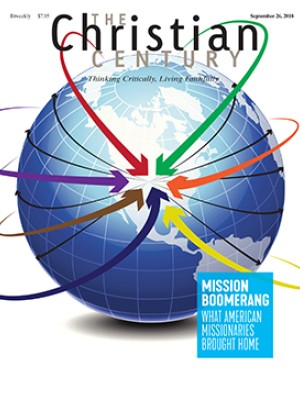October 21, Ordinary 29B (Hebrews 5:1-10; Mark 10:35-45)
Bumbling along in the footsteps of Melchizedek
Although I have been an Episcopalian for almost 20 years and a priest for more than ten, I am still surprised when I bump into an old-fashioned image of Christ found in many Episcopal churches: Jesus on the cross, not nailed, naked, and suffering, but tranquil, triumphant, and vested in alb, stole, chasuble, and even a maniple (a High Church vestment resembling a fancy dish towel). This image, the resurrected Jesus as Episcopal priest, always strikes me as both presumptuous and odd. But I can’t help but think that this Sunday’s reading from Hebrews might provide the perfect caption: “You are a priest forever, according to the order of Melchizedek.”
Some of my classmates used to jokingly declare this to one another across our seminary hallways, in voices you might mistake for a Monty Python sketch. It is a catchy phrase, with a weird but solid ring to it, worthy of a meme or T-shirt campaign. Who was this fantastically named Melchizedek? He was king of Salem and a priest, which is peculiar because no one else in scripture was ever both, much less generations before the Levitical priesthood even existed. Melchizedek’s story is entirely contained within a few verses near the end of Genesis 14, where he meets Abram, offers him bread and wine, blesses him, and vanishes—although not before Abram gifts him one tenth of his family’s possessions.
Read our latest issue or browse back issues.
Not surprisingly, some Christians read Christ backward into this enigmatic person. “Melchizedek” means “king of righteousness.” Salem, an otherwise unknown place, has the same spelling in Hebrew as shalom. Clearly, a king of righteousness and peace who appears in the wilderness, hosts a meal of bread and wine, and is deserving of tithes is an irresistible candidate for Jesus peekaboo. And who else could be both a priest and a king but the Messiah?
Melchizedek appears only in Hebrews, Genesis 14, and Psalm 110, where we find the first use of the “priest forever” line. The writer of Hebrews remakes that verse into a christological meme: Jesus is a priest forever, according to the order of Melchizedek. In other words, Jesus is a priest different from the institutional priesthood of his day—and a priest who sacrifices himself. This eternal and singular priesthood of Jesus is so important for Hebrews that it repeats the phrase (or close variations) seven times, like the refrain of a hymn or political speech.
Yet the theme of Jesus our great high priest doesn’t appear much in prayers, sermons, Bible studies, or Sunday school lessons. Perhaps this is because we live in an age of discomfort with any notion that clergy are special or set apart, not least because untold numbers of clergy of all denominations are being exposed for using the special authority of the office to sexually abuse children and vulnerable adults. Priesthood is associated with arrogance and privilege, not love and service.
In the Episcopal Church, priesthood—like baptism—can’t be undone. I’m not romanticizing this fact; online ordination as a Universal Life minister is also for life. On the other hand, a friend of mine who was a Lutheran pastor for many years lost her ordained status when she switched to a secular vocation. Since I decided last year to take a step back from parish ministry and work out my vocation as a writer, I think about this often. Even though I no longer have a pulpit, an altar, or the ability to contribute as much to my pension as I used to, I remain a priest. I am still called “the Reverend,” still required to offer my ordained ministry in some way, and still expected to obey my bishop. I am bumbling along in the footsteps of Melchizedek, a priest forever, figuring out how to continue to live as a “pastor, priest and teacher,” as my church’s prayer book puts it, without a parish to be responsible for.
Jesus spends zero time in his ministry contemplating the meaning of priesthood. He isn’t much interested in religious institutions, except to call out corruption or legalism. He calls on leaders, priests and otherwise, to privilege relationships over rules and solidarity over status. When James and John ask for privileged positions next to Jesus “in glory” in this week’s Gospel, Jesus takes them down a notch: glory in the kingdom of God doesn’t look like glory in the kingdom of people. Glory in religious leadership must be about humility, service, and love. This has always been a challenge for clergy, to turn away from the glory of privilege to the glory of Christ and the glory in each person we meet and serve.
Priesthood, whether named priest, pastor, minister, or elder, is no pure or foolproof institution, and these days it draws a lot more suspicion than deference. Maybe this wacko line, “A priest forever, according to the order of Melchizedek,” can encourage arrogance and preciousness in clergy, but I believe it can also capture the oddity, in this day and age, of a vocation to ordained ministry. Why not invoke the story of a person with an unpronounceable name, who offers people bread, wine, and blessings, who receives some gifts and donations for his time, who perhaps could be mistaken for the Messiah but, as Hebrews retells the story, points beyond himself to Christ? Why not stand in the footsteps of the priesthood of Jesus as Hebrews describes it, not because clergy are special but because we are a bit odd, choosing to sacrifice ourselves to a life of service, compassion, rejection, and plenty of “loud cries and tears”?
I’m ordering my T-shirt now.






